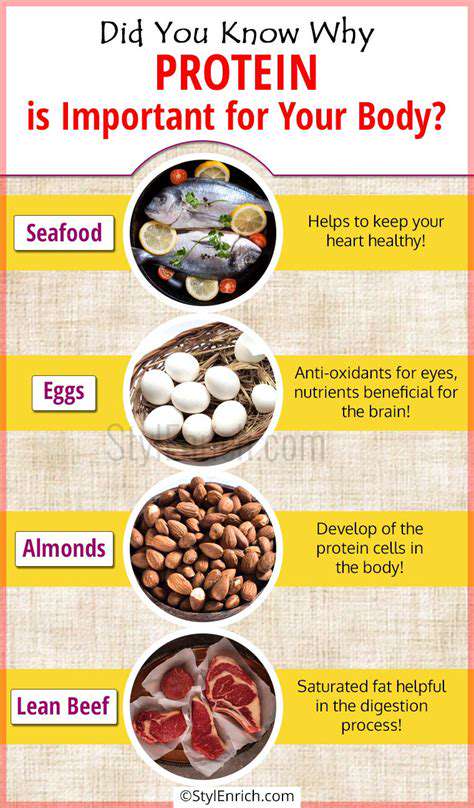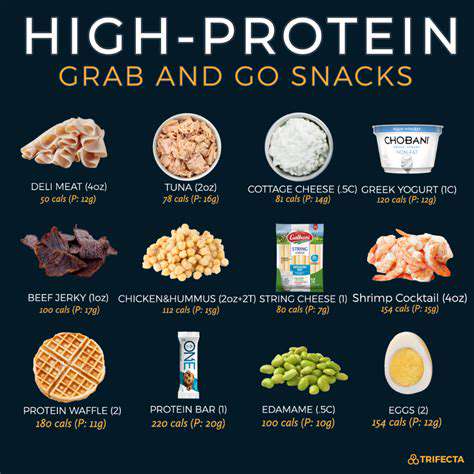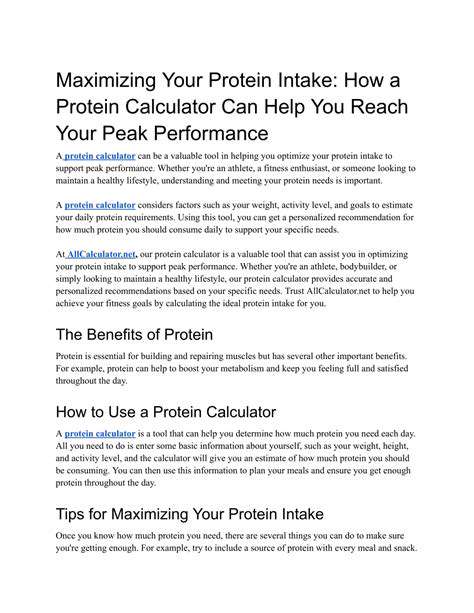High Protein Snacks: Fuel Your Day
Jun 16, 2025 / btwgardenmachine/
The Importance of Protein in Your Diet

Protein's Role in Building and Repairing Tissues
Protein is the cornerstone of your body's structural integrity. Every cell relies on protein for its formation, maintenance, and repair. From the muscles that power your movements to the skin that protects you, protein serves as the essential material your body uses to rebuild itself daily. The continuous process of protein synthesis demands a steady influx of amino acids - these molecular building blocks are what make tissue regeneration possible.
Imagine your body as a constantly evolving structure where protein acts as both the construction crew and building materials. Without adequate protein, this maintenance system breaks down, leading to slower recovery and compromised function. This becomes especially crucial for active individuals and those healing from injuries, as their bodies require additional protein resources for proper rehabilitation.
Protein's Impact on Metabolism and Energy Regulation
Beyond its structural role, protein significantly influences how your body processes energy. The thermic effect of protein digestion means your body expends more calories processing protein compared to other macronutrients. This metabolic boost can contribute to more efficient calorie burning throughout your day. Additionally, protein helps maintain stable blood sugar levels, preventing the energy rollercoaster caused by carbohydrate-heavy diets.
Protein's satiating properties make it a powerful ally in appetite management. The extended digestion time of protein-rich foods creates a lasting sense of fullness, naturally helping to control calorie intake. This steady energy release supports consistent performance throughout your daily activities without the crashes associated with sugary snacks.
Protein's Vital Functions in Hormone and Immune System Support
Your body's chemical messengers - hormones - depend heavily on protein for their production. These critical compounds regulate everything from your mood to your growth patterns. Insufficient protein can disrupt this delicate hormonal balance, potentially leading to various health complications. Similarly, your immune defenses rely on protein to manufacture antibodies - the specialized proteins that identify and neutralize threats.
A robust immune response requires adequate protein reserves to maintain defensive capabilities. When protein intake falls short, your body's ability to fight infections diminishes, prolonging recovery times and increasing vulnerability to illness. Maintaining proper protein levels ensures your biological systems have the resources they need to function optimally.

Smart Protein Snacking Strategies
Quick Protein Solutions for Busy Lifestyles
When time is limited but nutrition matters, portable protein options save the day. A small container of Greek yogurt or a palmful of almonds delivers both convenience and nutrition. These protein-rich choices provide the perfect balance of portability and sustenance for students, professionals, or anyone needing efficient nourishment.
For a more customized approach, protein smoothies offer endless possibilities. Blend your preferred protein source with fruits and liquids to create a tailored nutritional boost. This adaptable format accommodates various dietary needs while delivering essential nutrients in a delicious, easy-to-consume form.
Satisfying Protein Combinations
When hunger strikes between meals, balanced protein pairings provide lasting satisfaction. Combine lean proteins with fiber-rich vegetables for snacks that sustain. The complementary textures and flavors create enjoyable eating experiences while delivering comprehensive nutrition.
Dairy-based options like cottage cheese paired with antioxidant-rich fruits offer another dimension of versatility. The creamy texture contrasts beautifully with juicy berries, creating a snack that satisfies both nutritionally and sensorially.
Innovative Protein Creations
Protein nutrition doesn't have to mean boring eating. Thoughtfully crafted protein bars using quality ingredients can satisfy sweet cravings while contributing to daily protein goals. Look for options prioritizing whole food components over processed additives.
For snackers who enjoy variety, homemade trail mixes allow for complete customization. Combine nuts, seeds, and dried fruits with protein powder for a nutrient-dense snack that travels well. The mix of textures and flavors keeps snacking interesting while providing sustained energy.

Optimizing Protein Consumption
Protein's Fundamental Role in Physical Development
As a critical macronutrient, protein serves as the foundation for muscular development and repair. The process of muscle protein synthesis depends entirely on adequate amino acid availability. Regular protein consumption ensures your body has the necessary components for tissue maintenance and growth, particularly important for those engaged in physical training.
Diverse Protein Sources for Comprehensive Nutrition
High-quality proteins come from various animal and plant sources, each offering unique nutritional profiles. Animal proteins typically provide complete amino acid profiles, while plant sources offer beneficial fiber and phytonutrients. Dairy products represent an excellent two-for-one nutritional value, delivering both protein and bone-supporting calcium. Including diverse protein sources in your diet ensures you receive a broad spectrum of essential nutrients.
Personalized Protein Requirements
Protein needs vary significantly based on individual factors including activity patterns and body composition. Those engaged in regular strength training typically require increased protein to support muscular adaptation. Professional guidance can help determine your ideal protein intake based on your specific circumstances and objectives.
Strategic Protein Timing
Distributing protein intake evenly across meals and snacks maximizes your body's ability to utilize amino acids efficiently. This approach creates consistent anabolic conditions throughout the day. Particular attention should be paid to post-exercise nutrition when muscles are most receptive to protein for recovery and growth.
Supplementation Considerations
While whole foods should form the foundation of your protein intake, supplements can provide practical solutions for meeting increased needs. View protein powders as nutritional tools rather than complete meal replacements. Always consult healthcare professionals before making significant changes to your supplementation routine.
Balanced Protein Consumption
While essential, protein should be consumed as part of a balanced nutritional approach. Mindful eating involves listening to your body's signals and adjusting intake accordingly. Variety in protein sources helps prevent potential nutritional imbalances while providing a spectrum of health benefits.